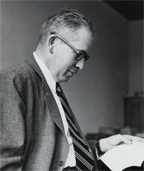  |
|---|
The fact that the Porter Prize, a literary prize established in memory of Dr. Ben Drew Kimpel, does not mention his name speaks volumes about the man. Dr. Ben Kimpel asked that the prize for Arkansas writers be named for his mother, Gladys Crane Kimpel Porter.
Generosity defined Dr. Ben Kimpel. As a teacher, scholar and friend (and unknown benefactor to who knows how many, since he always wished each act to be kept private), he was without peer. As Chairman of the English Department at the University of Arkansas at Fayetteville, where he taught from 1952 until his death in 1982, he was helpful to writers, students and colleagues.
A native of Fort Smith, Ben Kimpel earned a bachelor of arts degree and a master's degree in English from Harvard University and a Ph.D. from the University of North Carolina. The subject of his doctoral thesis was Herman Melville. He served as a translator for the U.S. Army during World War II and in post war Germany. He was posted with the State Department in Vienna during the early years of the Cold War.
Fluent in French and German, Dr. Ben Kimpel had a reading knowledge of Old English and Middle English, Italian, Latin, Greek. Provencal, Russian, Spanish, Chinese and Japanese. He taught college courses in Old English and Middle English, Chaucer, Germanic and Celtic Literature, Medieval Literature, Renaissance Drama, 20th Century Continental Literature, Modern World Drama 17th, 18th and 19th Century British Literature, the Modern American Novel, Modern American Poetry. He also taught translation workshops, seminars on Milton, Yeats, Joyce and Eliot, Continental Romanticism, Comparative Religion, literature of China and Japan, and religion and literature of the Far and Near East.
At the University of Arkansas, Dr. Ben Kimpel collaborated with his good friend and fellow professor, Dr. Duncan Eaves, to publish a biography of 18th Century British novelist Samuel Richardson. The two worked for 15 years on the biography titled "Samuel Richardson, A Biography", which was published in 1971, and is considered the definitive biography of Richardson. He was analyzing Ezra Pound's Cantos when he died at his home in Fayetteville.
